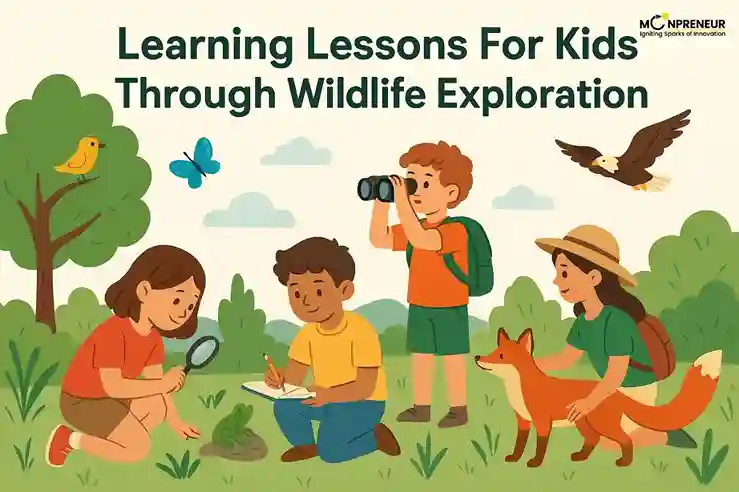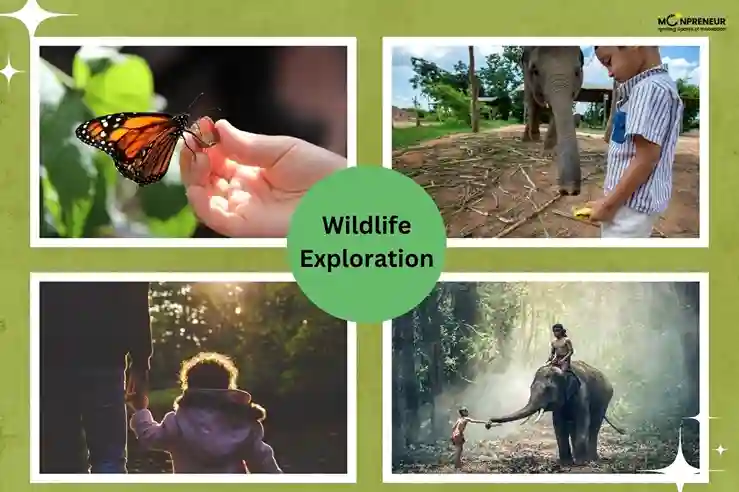
Children are naturally curious explorers. They often wonder why birds fly, where insects live, or how animals survive in the wild. Wildlife exploration gives kids a chance to find answers through hands-on learning. By engaging with animals, plants, and natural environments, children discover valuable life lessons, strengthen problem-solving skills, and build empathy toward living beings. It’s not just fun—it’s a powerful educational journey.
Why Wildlife Exploration is Important for Kids

Wildlife exploration provides children with unique opportunities to grow academically, socially, and emotionally. Unlike classroom lessons, outdoor exploration helps kids connect learning with real-world experiences.
- Boosts Curiosity: Kids naturally ask “why” and “how” questions while observing animals.
- Encourages Observation: Looking closely at nature sharpens focus and attention.
- Teaches Responsibility: Caring for plants or pets instills a sense of duty.
- Improves Emotional Intelligence: Kids learn kindness, patience, and empathy.
- Promotes Physical Activity: Exploring outdoors keeps them healthy and active.
When children understand the importance of nature, they grow into responsible adults who care for the planet.
Life Lessons Kids Learn Through Wildlife
- Science Beyond Books
Exploring wildlife teaches kids biology, animal behavior, and ecosystems in an exciting way. Instead of reading about food chains, they see it in action when a bird eats a worm or when ants carry food. - Empathy and Compassion
Observing how animals nurture their young or build homes helps kids develop compassion. It teaches them that all creatures have needs and feelings. - Critical Thinking and Problem-Solving
When kids try to identify tracks, patterns, or habitats, they naturally use problem-solving skills. This kind of thinking improves their decision-making abilities. - Conservation and Sustainability
Through wildlife activities, kids learn why protecting endangered animals, saving forests, and reducing pollution matter. These values inspire them to make eco-friendly choices. - Patience and ObservationWaiting quietly for a bird to land or a butterfly to emerge builds patience and mindfulness—skills valuable in both learning and life.
Recommended Reading: Community Helpers for Kids: Engaging Activities and Learning Resources
Engaging Wildlife Activities for Kids
- Backyard Exploration: Encourage kids to observe insects, plants, and birds right at home.
- Bird Watching Adventures: Equip kids with binoculars and a guidebook to track bird species.
- Zoo and Safari Visits: Teach them about wild animals and their natural habitats.
- Nature Journaling: Let kids sketch, write, or photograph their findings to build observation skills.
- DIY Mini Habitats: Build butterfly gardens, insect hotels, or bird feeders to attract wildlife.
- Camping Trips: Combine adventure with hands-on learning about nocturnal animals, stars, and ecosystems.
These fun wildlife activities for kids create long-lasting learning experiences.
Role of Parents and Teachers in Wildlife Learning
Parents and educators play a crucial role in turning wildlife exploration into structured learning.
- Encourage Curiosity: Let kids ask questions and help them find answers.
- Provide Resources: Books, apps, and documentaries can support their wildlife learning.
- Practice Safety: Teach kids how to observe animals respectfully without disturbing them.
- Inspire Responsibility: Involve children in eco-friendly activities like recycling or tree planting.
When adults guide exploration, kids not only enjoy the experience but also understand its deeper lessons.
Recommended Reading: 12 Fun & Educational Artificial Intelligence Games & Activities for Kids
Long-Term Benefits of Wildlife Exploration for Kids
- Stronger environmental awareness.
- Better academic performance in science and geography.
- Development of life skills such as teamwork and communication.
- Emotional growth through empathy and mindfulness.
- A lifelong love for nature and wildlife conservation.
These benefits go beyond childhood, shaping kids into responsible and compassionate global citizens.
Final Thoughts
Wildlife exploration is more than an adventure—it’s a learning journey. From discovering the wonders of ecosystems to developing empathy, patience, and responsibility, kids learn lessons that last a lifetime. By encouraging children to engage with nature, parents and teachers can nurture curious, kind, and eco-conscious learners who will contribute positively to the world.
Moonpreneur is on a mission to disrupt traditional education and future-proof the next generation with holistic learning solutions. Its Innovator Program is building tomorrow’s workforce by training students in AI/ML, Robotics, Coding, IoT, and Apps, enabling entrepreneurship through experiential learning.
FAQs:
Ans: Wildlife exploration helps kids learn science, empathy, observation, and problem-solving in real-life situations, making education fun and meaningful.
Ans: Simple activities include bird watching, nature journaling, building insect hotels, backyard exploration, and visiting zoos or safaris.
Ans: Wildlife helps children build curiosity, empathy, and responsibility while improving academic knowledge and life skills.
Ans: Parents can support kids by taking them outdoors, providing guidebooks or documentaries, and encouraging eco-friendly activities.
Ans: Kids gain environmental awareness, stronger academic performance, patience, teamwork, and a lifelong connection with nature.
























